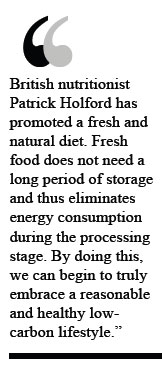Voices
Do meat-free meals serve up a genuine low-carbon lifestyle?
By Wang Xufeng (China Daily)
Updated: 2010-04-21 10:55
 |
Large Medium Small |
Recently, I saw a slogan on a subway billboard: "A low-carbon life means eating no meat." And in the company canteen, when I asked a colleague why she picked out all the meat in her meal, she answered, "This is a low-carbon life. You're out."
"Low-carbon life" has become a popular catchphrase that reflects a pro-environment and prohealth lifestyle. Promoting the low-carbon lifestyle has become a social trend.

I reckon you have heard such views. However, I doubt if it is really all that bad and "high carbon" to eat meat.
First, most poultry, animal meat and seafood come from the industry of fish and poultry breeding. Despite the quantities of fodder, water and electricity that are consumed in the process of animal breeding, the pollution or energy consumption is much less than that from the production of cement and plastics.
Second, some cite carbon dioxide emissions produced by cattle as the main source of global warming; that the gas produced by 1.05 billion cattle around the globe has exceeded the total amount of carbon dioxide produced by cars, planes and other means of transport.
Some news articles report that the burps and farts of cattle and sheep create serious pollution, scientists have been researching feed that prevents animals from that belching.
If we follow such nonsense, we must kill all the animals to rescue the environment. It's true that the industry of fish and poultry breeding will certainly release some carbon dioxide. But one cannot say global warming is caused by breeding too many animals.
Third, if dining without meat is equal to a low-carbon lifestyle, eating eggs and milk should also be restricted, since cows and chickens produce carbon dioxide as well. However, milk, eggs and meat, as we all know, are the best sources of protein sources for humans.
Although eating too much meat might trigger diseases, it doesn't mean meat is not useful. Without it, our dining is simpler and duller, and it might result in an unbalanced diet, too.
Instead of restricting the eating of meat, we might just as well focus on banning fast-food products that will produce plastic rubbish or banning the food and beverages prepared with added preservatives, such as sodas, candies, ice creams, fried chips and preserved fruits.
We could also ban processed meat products such as sausage, ham, bacon and canned meat.
British nutritionist Patrick Holford has promoted a fresh and natural diet. Fresh food does not need a long period of storage and thus eliminates energy consumption during the processing stage. By doing this, we can begin to truly embrace a reasonable and healthy low-carbon lifestyle.
I also believe a fresh and natural diet is the essence of a low-carbon diet.
Excerpts of a comment that first appeared in Beijing Youth Daily on April 16.







